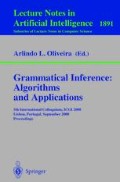Abstract
Let BC be the model of behaviourally correct function learning as introduced by Barzdins [4] and Case and Smith [8]. We introduce a mind change hierarchy for BC, counting the number of extensional differences in the hypotheses of a learner. We compare the resulting models BC n to models from the literature and discuss confidence, team learning, and finitely defective hypotheses. Among other things, we prove that there is a tradeoff between the number of semantic mind changes and the number of anomalies in the hypotheses. We also discuss consequences for language learning. In particular we show that, in contrast to the case of function learning, the family of classes that are confidently BC-learnable from text is not closed under finite unions.
Access this chapter
Tax calculation will be finalised at checkout
Purchases are for personal use only
Preview
Unable to display preview. Download preview PDF.
References
Ambainis, A., Jain, S., Sharma, A.: Ordinal mind change complexity of language identification. In: Ben-David, S. (ed.) EuroCOLT 1997. LNCS (LNAI), vol. 1208, pp. 301–316. Springer, Heidelberg (1997)
Ambainis, A., Freivalds, R., Smith, C.H.: Inductive Inference with Procrastination: Back to Definitions. Fundamenta Informaticae 40, 1–16 (1999)
Angluin, D.: Inductive inference of formal languages from positive data. Information and Control 45, 117–135 (1980)
Bārzdins, J.M.: Two theorems on the limiting synthesis of functions. Theory of Algorithms and Programs 1, 82–88 (1974) (in Russian)
Bārzdins, J.M., Freivalds, R.: On the prediction of general recursive functions. Soviet Mathematics Doklady 13, 1224–1228 (1972)
Blum, L., Blum, M.: Toward a mathematical theory of inductive inference. Information and Control 28, 125–155 (1975)
Case, J., Jain, S., Sharma, A.: Complexity issues for vacillatory function identification. Information and Computation 116(2), 174–192 (1995)
Case, J., Smith, C.: Comparison of identification criteria for machine inductive inference. Theoretical Computer Science 25, 193–220 (1983)
Freivalds, R., Smith, C.: On the role of procrastination in machine learning. Information and Computation 107, 237–271 (1993)
Gold, E.M.: Language identification in the limit. Information and Control 10, 447–474 (1967)
Jain, S., Osherson, D., Royer, J.S., Sharma, A.: Systems that learn, An introduction to learning theory, 2nd edn. MIT Press, Cambridge (1999)
Kearns, M.J., Vazirani, U.V.: An introduction to computational learning theory. MIT Press, Cambridge (1994)
Kummer, M., Stephan, F.: On the structure of degrees of inferability. Journal of Computer and System Sciences 52, 214–238 (1996)
Odifreddi, P.: Classical Recursion Theory. North-Holland, Amsterdam (1989)
Odifreddi, P.: Inductive inference of total functions. In: Cooper, S.B., Slaman, T.A., Wainer, S.S. (eds.) Computability, Enumerability, Unsolvability. Directions in Recursion Theory. London Math. Soc. Lecture Note Series, vol. 224, pp. 259–288 (1996)
Osherson, D.N., Stob, M., Weinstein, S.: Aggregating inductive expertise. Information and Computation 70(1), 69–95 (1986)
Sharma, A., Stephan, F., Ventsov, Y.: Generalized notions of mind change complexity. In: Proceedings of the Tenth Conference on Computational Learning Theory (COLT 1997), Nashville, pp. 96–108 (1997)
Smith, C.: The power of pluralism for automatic program synthesis. J. ACM 29(4), 1144–1165 (1982)
Soare, R.I.: Recursively enumerable sets and degrees. Springer, Heidelberg (1987)
Terwijn, S.A.: Extensional set learning. In: Proceedings of The Twelfth Annual Conference on Computational Learning Theory (COLT 1999), Santa Cruz, pp. 243–248 (1999)
Author information
Authors and Affiliations
Editor information
Editors and Affiliations
Rights and permissions
Copyright information
© 2000 Springer-Verlag Berlin Heidelberg
About this paper
Cite this paper
Stephan, F., Terwijn, S.A. (2000). Counting Extensional Differences in BC-Learning. In: Oliveira, A.L. (eds) Grammatical Inference: Algorithms and Applications. ICGI 2000. Lecture Notes in Computer Science(), vol 1891. Springer, Berlin, Heidelberg. https://doi.org/10.1007/978-3-540-45257-7_21
Download citation
DOI: https://doi.org/10.1007/978-3-540-45257-7_21
Publisher Name: Springer, Berlin, Heidelberg
Print ISBN: 978-3-540-41011-9
Online ISBN: 978-3-540-45257-7
eBook Packages: Springer Book Archive

